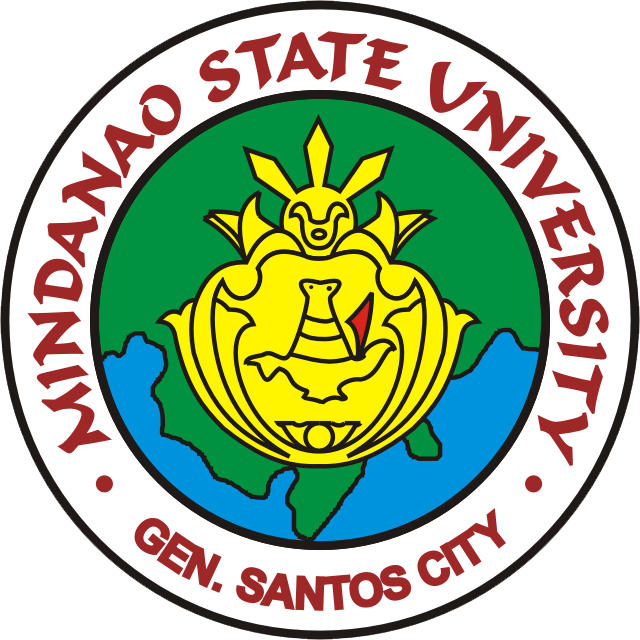MSU-Gensan and LGU-General Santos Sign Landmark Agreement to Establish Coastal and Marine Conservation and Research Center
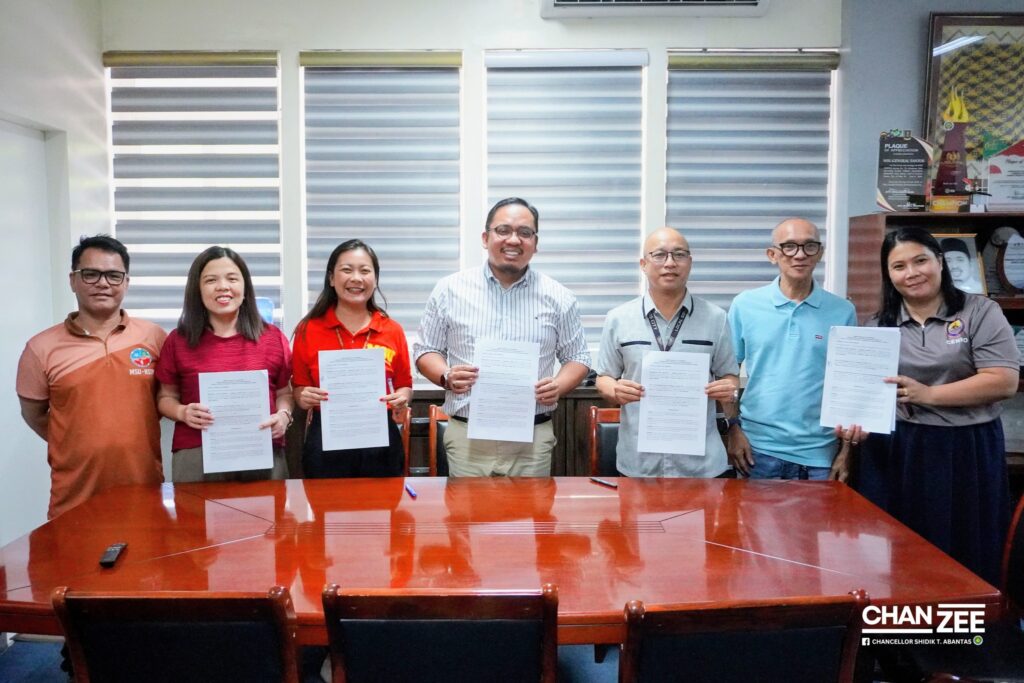
Mindanao State University – General Santos, under the leadership of Chancellor Shidik Zed T. Abantas, proudly announces the formal signing of a Memorandum of Agreement with the Local Government Unit of General Santos City led by Mayor Lorelie G. Pacquiao and the Sarangani Bay Protected Seascape – Protected Area Management Board for the Establishment, Operation, and Management of the Gensan Coastal and Marine Conservation and Research Center. The agreement, finalized on May 16, 2025, marks a significant milestone in MSU-Gensan’s steadfast commitment to environmental stewardship, research excellence, and community partnership. The center will serve as a hub for scientific research, conservation initiatives, education, and community engagement aimed at protecting, conserving, and sustaining the coastal and marine environments of General Santos and Sarangani Bay. Chancellor Abantas expressed his enthusiasm for this collaborative effort, stating:“This agreement is more than just a document; it is a shared promise to future generations that we will take bold, deliberate steps to protect our marine and coastal resources. It underscores our responsibility as a university to advance science-based solutions while empowering local communities.” Mayor Lorelie G. Pacquiao also emphasized the LGU’s strong support for sustainable development and marine conservation, recognizing the critical importance of safeguarding Sarangani Bay, a vital natural resource for food security, tourism, and local livelihoods. The new Gensan Coastal and Marine Conservation and Research Center will conduct cutting-edge research on marine biodiversity, coastal ecosystems, and sustainable fisheries. It will implement conservation and habitat restoration projects, promote environmental education and public awareness campaigns, support local communities in developing sustainable livelihoods that align with conservation goals, and strengthen local, national, and international partnerships for marine conservation. This initiative aligns with MSU-Gensan’s strategic vision of delivering meaningful research and extension services that address real-world challenges, while also reinforcing the Philippines’ commitments under the Sustainable Development Goals (SDGs), particularly SDG 14: Life Below Water. With this partnership, MSU-Gensan affirms its role as an academic institution dedicated to building a sustainable and resilient future for Mindanao and beyond.
MSU-General Santos Advances Internationalization through Participation in CHED-led Erasmus+ and FSTP Mindanao Caravan
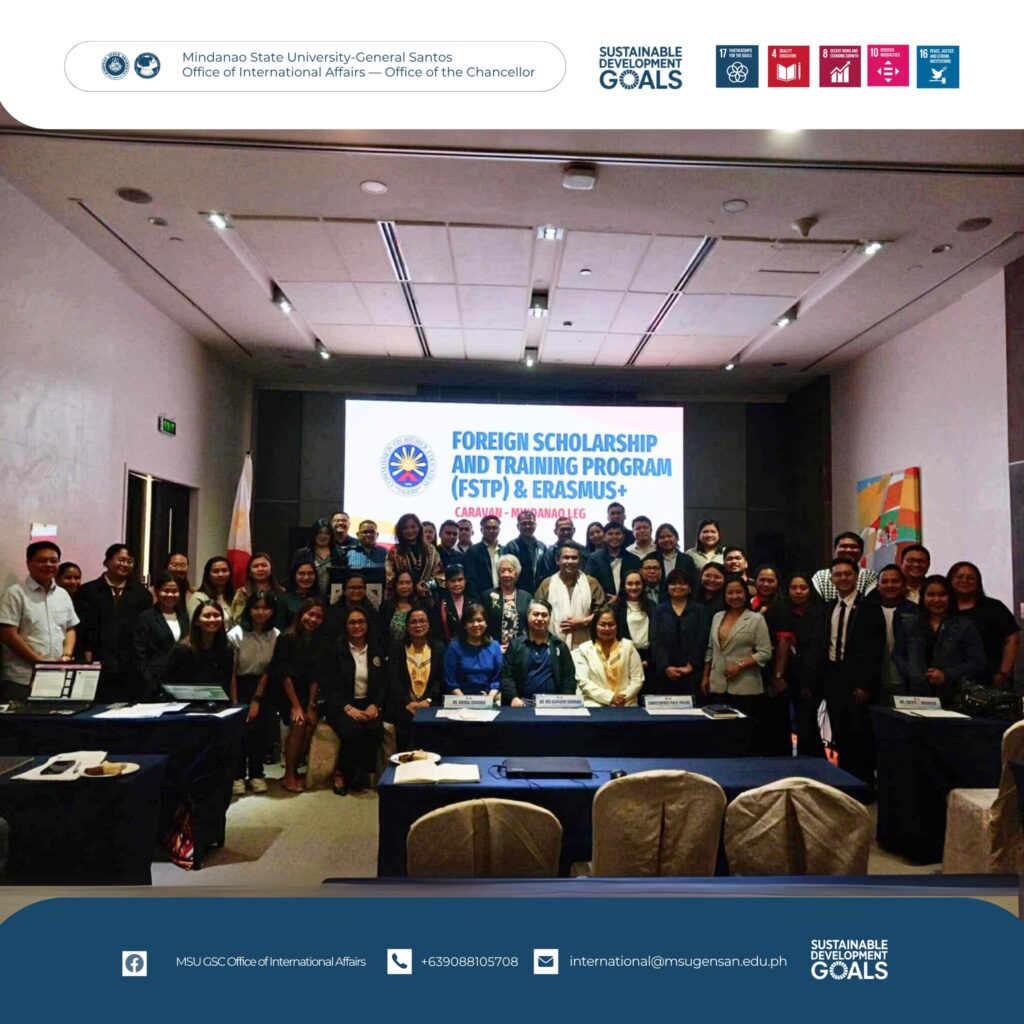
Mindanao State University–General Santos, under the leadership of Chancellor Atty. Shidik T. Abantas, MDM, LLM, continues to advance its commitment to internationalization by actively engaging in strategic national initiatives. Representing the university, Dr. Anderson V. Villa, Director of the Office of International Affairs, joined the Erasmus+ and FSTP Caravan – Mindanao Leg held on June 11–12, 2025, at Park Inn by Radisson in Davao City. Organized by the Commission on Higher Education Regional Office XI in collaboration with the CHED International Affairs Service (IAS), the two-day caravan convened over 100 internationalization focal persons from Higher Education Institutions (HEIs) across Regions IX, X, XI, XII, and Caraga. The event served as a vital platform to promote global academic mobility, strengthen institutional partnerships, and advance access to international scholarship and training opportunities through the Erasmus+ Program and the Foreign Scholarship and Training Program (FSTP). The first day focused on the Erasmus+ Program, the European Union’s flagship initiative for student and faculty exchanges, joint degree development, and institutional capacity-building. Participants received comprehensive orientations about the program’s components, opportunities for collaborative research, and practical strategies for launching successful exchange initiatives. A highlight of the day was the inspiring testimony of Mr. Janreve Odango from CHED Region XII, who shared his transformative journey as an Erasmus Mundus scholar in Latvia, offering valuable guidance for institutional representatives and future scholars. Participants also heard firsthand accounts from other Filipino scholars and program alumni currently engaged in Erasmus+ initiatives, who emphasized the program’s impact on cross-cultural understanding, academic enrichment, and professional growth. These stories underscored the crucial role of international partnerships in strengthening the global competitiveness of Philippine HEIs. On the second day, the seminar expanded its scope to introduce a broad array of foreign scholarship and training opportunities offered through bilateral government agreements and embassy-affiliated programs. Delegates from Korea, Japan, Hungary, Taiwan, the United States, and Israel presented diverse grant opportunities designed for Filipino students, faculty, and researchers. Scholars who benefited from these programs shared how international education broadened their professional horizons, fostered innovation within their institutions, and contributed to national development goals. MSU-Gensan’s active participation in the caravan demonstrates its strategic commitment to internationalization as a cornerstone of institutional development. By engaging in initiatives such as Erasmus+ and FSTP, the university aims to broaden academic networks, foster collaborative research, and expand access to global learning opportunities. These efforts empower students, faculty, and staff to cultivate global competencies and lead meaningful international engagements that strengthen MSU-Gensan’s position as a resilient, inclusive, and globally competitive institution. Moreover, the university’s involvement in these programs supports the realization of United Nations Sustainable Development Goals (SDGs)—especially SDG 4 (Quality Education), SDG 8 (Decent Work and Economic Growth), and SDG 17 (Partnerships for the Goals). By promoting lifelong learning, enhancing employment readiness, and building equitable, cross-border partnerships, MSU-Gensan continues to demonstrate its commitment to sustainable development and global academic excellence.
MSU-Gensan Student Council Resolution Spurs CHED to Draft National Anti-Red-Tagging Policy
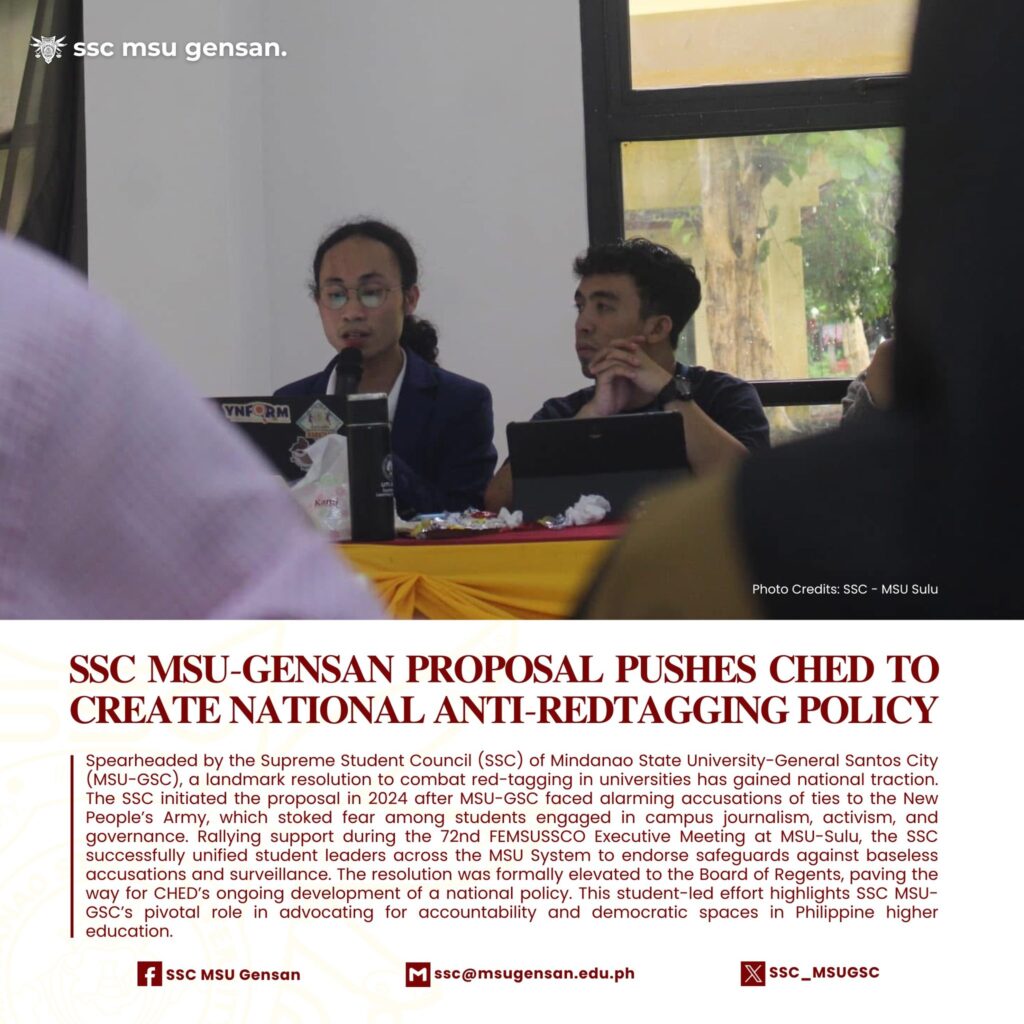
In a major breakthrough for student rights and democratic advocacy, the Commission on Higher Education (CHED) is officially moving forward with the development of a national policy aimed at eradicating red-tagging practices within colleges and universities across the Philippines. This progressive step responds to a formal resolution authored and championed by the Supreme Student Council (SSC) of Mindanao State University – General Santos City (MSU-GSC), following a deeply troubling wave of red-tagging incidents in 2024 that unjustly associated the university with the New People’s Army (NPA). These allegations, lacking evidence and due process, sparked widespread fear and anxiety within the university community. Students involved in campus journalism, activism, and student governance felt particularly vulnerable—many facing unwarranted accusations, intrusive surveillance, and harassment simply for exercising their constitutional rights to free expression and civic engagement. The events painted a disturbing picture of a hostile academic environment, calling into question the state of academic freedom and student protection in higher education. Moved by the urgency of the situation, MSU-GSC’s Supreme Student Council rose to the occasion, bringing the issue to national attention during the 72nd Federation of MSU Supreme Student Councils (FEMSUSSCO) Executive Meeting held at MSU-Sulu. There, they successfully tabled a resolution calling for the institutionalization of policies that protect students from red-tagging, unjust profiling, and political persecution. The resolution resonated with fellow student leaders from other MSU campuses and was adopted with overwhelming support. The resolution was later formally presented to the MSU Board of Regents (BOR) through Student Regent Hon. Edriane Casipong, who served as the primary voice for student constituents on the university’s highest governing body. In his appeal, Casipong emphasized that red-tagging undermines not only student rights but also the integrity and democratic foundations of educational institutions. He reiterated that without clear safeguards, students risk being silenced, criminalized, or excluded from the very spaces designed to nurture leadership, innovation, and service. In response to this bold student-led initiative, CHED has begun taking concrete steps toward creating a comprehensive national anti-red-tagging policy. This landmark policy aims to set clear guidelines and mechanisms to shield students and academic communities from political labeling and persecution, ensuring that campuses remain safe spaces for intellectual freedom, civic discourse, and activism. Student councils, human rights groups, and education stakeholders have since praised the development, noting it as a turning point for higher education governance in the Philippines. Many see this move as a critical step in dismantling a culture of fear and replacing it with one of accountability, transparency, and participatory leadership. As CHED moves forward with stakeholder consultations and policy drafting, student leaders nationwide are hopeful that this initiative will usher in a more secure, inclusive, and democratic academic environment—where every student can freely express themselves, participate in social movements, and contribute to nation-building without fear of being vilified or targeted. This milestone is not just a victory for MSU-Gensan or the MSU System—it is a powerful testament to the strength of unified student advocacy and a reminder that even the most entrenched issues can be challenged and changed through persistence, dialogue, and courage.
MSU-General Santos Chancellor Administers Oath to Promoted and Tenured Faculty
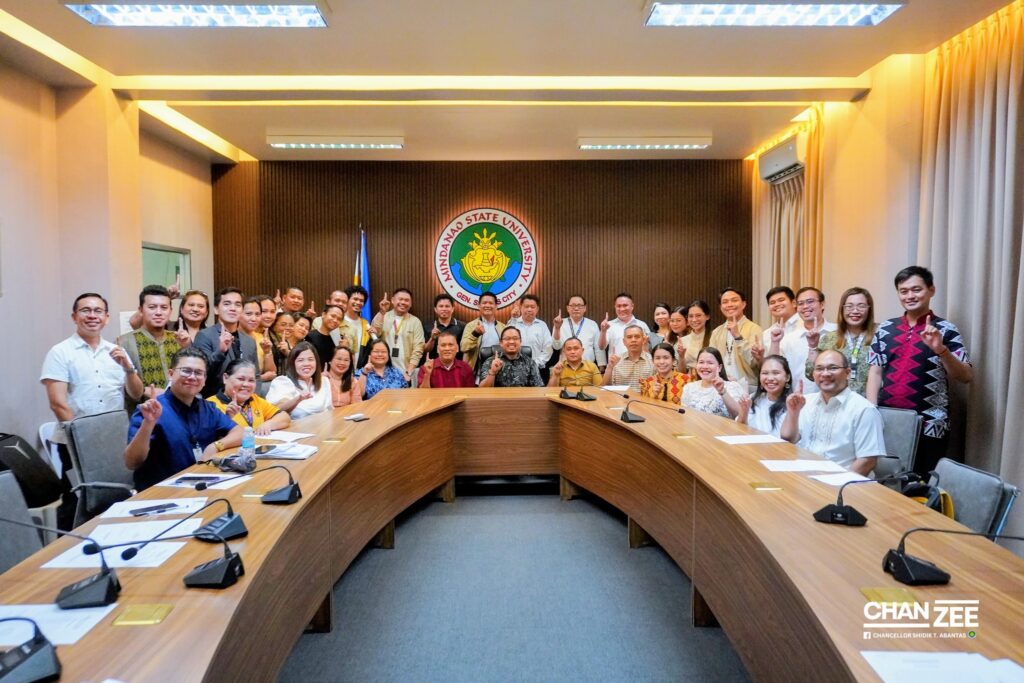
Mindanao State University – General Santos City proudly celebrated the academic achievements and professional advancement of its faculty as Chancellor Shidik Zed T. Abantas formally administered the oath of office to the university’s newly promoted and tenured faculty members on June 3, 2025. The ceremony served as a meaningful recognition of the dedication, excellence, and service that these faculty members have demonstrated throughout their careers at MSU-General Santos. It also reinforced the university’s commitment to fostering faculty development, promoting academic excellence, and supporting the professional growth of educators who serve as the backbone of the institution. Chancellor Abantas expressed his heartfelt congratulations to the newly promoted and tenured faculty, acknowledging their valuable contributions to MSU-General Santos’ mission of delivering quality education, innovative research, and meaningful community engagement. “I am very happy to have administered the oath of our newly promoted and tenured faculty members. Congratulations and may you all continue to serve MSU and the people,” Chancellor Abantas said. University officials noted that faculty promotions and tenure are earned through rigorous evaluation processes that recognize excellence in teaching, research, and service. These milestones not only celebrate individual achievements but also strengthen MSU-General Santos’ reputation as a center of learning that invests in its people. This commitment aligns with the university’s strategic goals to build a strong, motivated, and highly qualified faculty workforce dedicated to producing graduates who are prepared to lead, innovate, and make a positive impact in their communities and beyond. As MSU-General Santos continues to uphold its tradition of excellence, it also reaffirms its dedication to supporting its faculty members in their professional journeys, empowering them to deliver transformative education and serve the people with integrity, competence, and passion. Congratulations once again to all our newly promoted and tenured faculty members!
MSU-General Santos Launches IDEA Admission Policy to Champion Inclusivity, Diversity, Equity, and Access
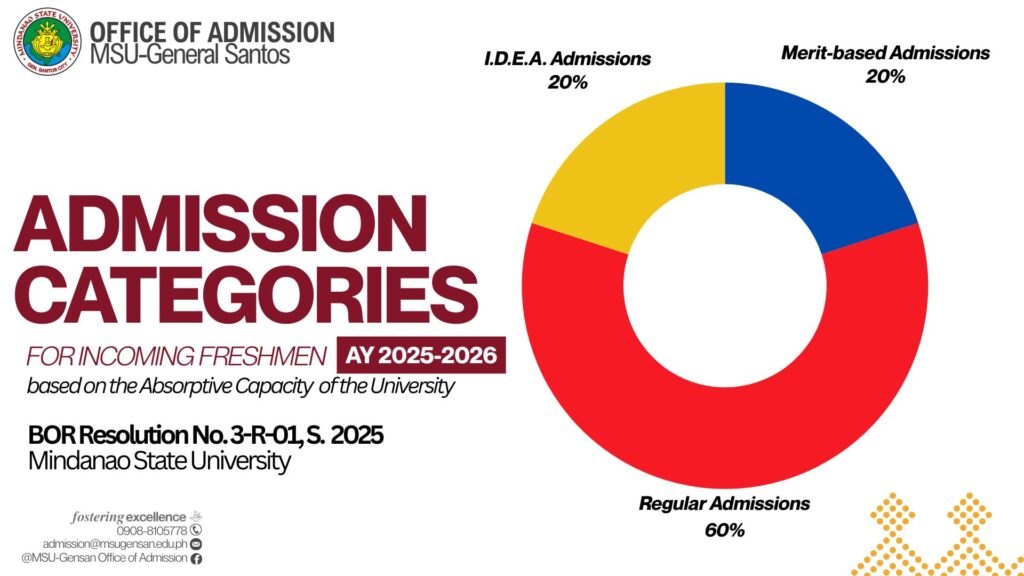
Mindanao State University – General Santos City has reaffirmed its commitment to transformative and equitable education with the launch of its IDEA Admission Policy, which stands for Inclusivity, Diversity, Equity, and Access. Approved under BOR Resolution No. 3-R-01, s. 2025, the IDEA Admission Policy aligns with the university’s strategic direction of serving as an institution for all—especially the underserved, underprivileged, and marginalized sectors of society. The Office of Admissions announced that while test performance remains an important component of the admission process, the revised policy now incorporates inclusive criteria that consider diverse life backgrounds, demonstrated skills, and individual talents. This approach ensures that deserving students from all walks of life have opportunities to pursue higher education at MSU-General Santos. The new admission policy also opens multiple pathways for enrollment, giving priority to underprivileged yet capable students while upholding the university’s mission of providing quality education that transforms lives. University leadership emphasized that this policy reflects MSU-Gensan’s role as a people’s university, committed to inclusivity, social justice, and nation-building through accessible education. As MSU-General Santos implements the IDEA Admission Policy, it signals a renewed pledge to foster an academic community where everyone, regardless of background, can thrive, excel, and contribute meaningfully to society. For incoming freshmen and their families, the Office of Admissions encourages careful review of the revised Admission Criteria and Process, now designed to recognize the unique strengths and potential of every applicant.
A clearer vision for all: MSU-Gensan and Borough Lasik Center forge partnership for eye care
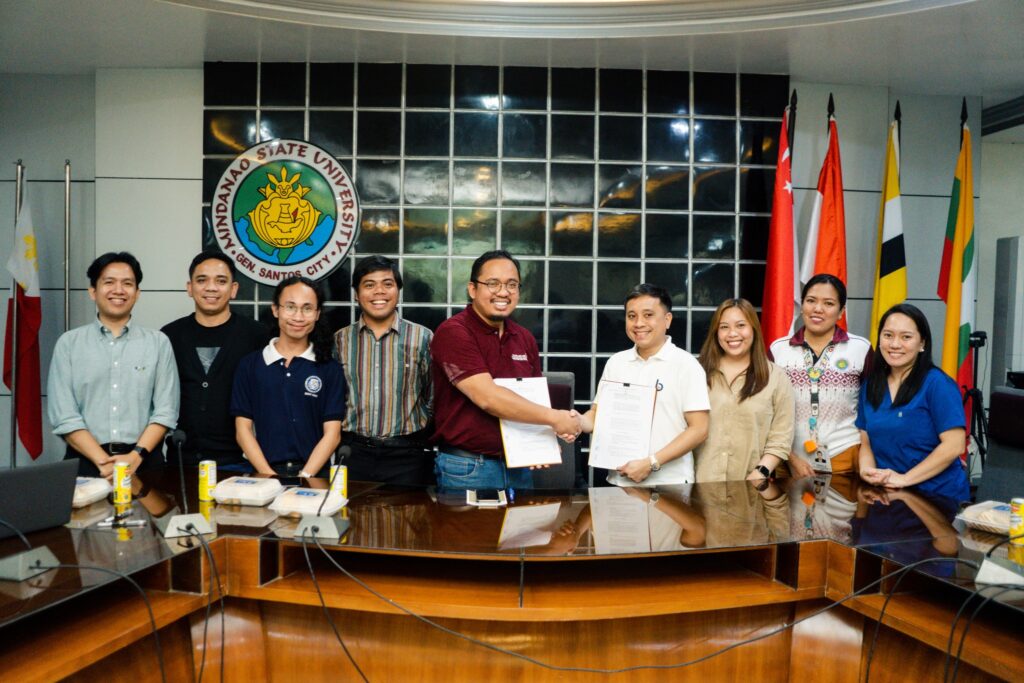
In a significant move to advance student wellness and promote accessible, high-quality health services, Mindanao State University – General Santos officially signed a Memorandum of Agreement (MOA) with Borough Lasik Center on May 16, 2025, at the MSU-Gensan Campus. The partnership aims to deliver affordable, comprehensive eye care services to the university community—including students, faculty, and staff—underscoring MSU-Gensan’s commitment to holistic development and well-being. The event began with welcome remarks from Ms. Sheila Marie E. Madriaga, RN, OIC for Medical Services at the Student Health Center. She stressed the university’s mission to prioritize health beyond academics, stating: “Today’s MOA signing is more than just a formal event—it is a reflection of our promise to care for the well-being of our community. We welcome this collaboration with Borough Lasik Center.” Ms. Gracie Mae Olorosisimo, RN, of the Student Health Center, introduced the esteemed guests, paving the way for a message from Ms. Anne Sino Cruz, Marketing Head of Borough Lasik Center. Cruz expressed the center’s desire to support MSU-Gensan’s holistic vision for its students: “With this partnership, we’re not just offering services; we’re offering care, especially to students that would help them in their learning.” Chancellor Shidik T. Abantas, MDM, LLM delivered a message of support, reaffirming MSU-Gensan’s commitment to partnerships that enrich student life and academic excellence. He emphasized that wellness and education must go hand in hand, stating: “At MSU-Gensan, our vision of fostering excellence extends far beyond the four walls of our classrooms. This collaboration with Borough Lasik Center is a forward-looking step that ensures our constituents have access to crucial health services.” Dr. Norman Ralph B. Isla, Vice Chancellor for Student Affairs, closed the program with a heartfelt message that underscored the importance of eye care in today’s digital age, reminding attendees of the challenges posed by increased screen time and academic demands in a post-pandemic world. This meaningful partnership is set to roll out vision care programs, free consultations, and discounted services for MSU-Gensan beneficiaries. By ensuring access to eye health services, the university is actively supporting its community in achieving academic goals and promoting lifelong wellness, reflecting its mission to deliver student-centered, holistic, and inclusive education.
MSU-GenSan Supports DSWD “Tara, Basa” Program Through Pre-Deployment of Tutors and Youth Development Workers
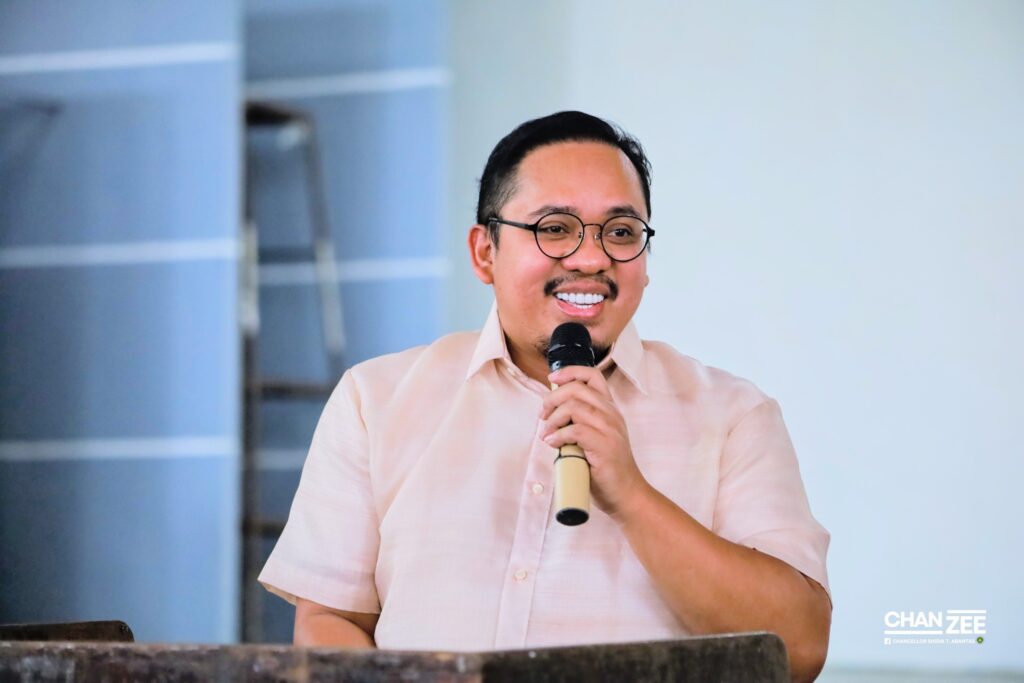
On May 14, 2025, Mindanao State University – General Santos City reaffirmed its strong commitment to community development and literacy advocacy by taking part in the Pre-Deployment Program of Tutors and Youth Development Workers for the DSWD Tara, Basa Program. This important event marks another milestone in MSU-GenSan’s partnership with the Department of Social Welfare and Development (DSWD) in advancing education and youth empowerment across the SOCSARGEN region. Held in collaboration with DSWD Region XII, the pre-deployment program gathered student volunteers, youth development workers, faculty, and partner agency representatives to formally prepare and orient participants before they begin their service in various communities and municipalities. Chancellor Shidik Zed T. Abantas emphasized the significance of this collaboration, highlighting MSU-GenSan’s mission of transformative education that extends beyond classroom walls. Through this initiative, students from the College of Education will serve as tutors to children in need of literacy support, directly addressing gaps in foundational learning and contributing to the nation’s broader goal of inclusive education. The Tara, Basa Program aims to improve reading proficiency and promote a culture of learning among disadvantaged children, particularly those in underserved and remote communities. By deploying trained tutors and youth development workers, the program provides targeted, community-based interventions that nurture academic growth and foster positive youth development. During the pre-deployment program, participating students were given essential briefings on their roles, responsibilities, and best practices for engaging with learners in the field. Sessions focused on teaching strategies, community engagement, child protection, and cultural sensitivity, ensuring that MSU-GenSan’s tutors are well-prepared to make a meaningful impact in their assigned areas. Chancellor Abantas expressed gratitude to DSWD XII for its partnership and trust in MSU-GenSan as an implementing partner. He also commended the dedication and service spirit of the student volunteers. “Our College of Education students embody the university’s vision of service, leadership, and excellence,” he shared. “Their willingness to serve in communities across the region shows our collective commitment to uplifting lives through education.” MSU-GenSan’s involvement in the Tara, Basa Program reflects its unwavering dedication to nation-building and aligns with the Sustainable Development Goals (SDGs), particularly SDG 4: Quality Education and SDG 10: Reduced Inequalities. By empowering students to be active partners in development work, the university not only enhances their learning experience but also strengthens its role as a catalyst for positive change in Mindanao. As these future educators prepare to share their knowledge and compassion in the field, MSU-GenSan stands proudly behind them, confident that their service will help create brighter, more equitable educational opportunities for the children of the SOCSARGEN region.
MSU-General Santos Chancellor Shares Exciting Update on Near-Completion of ICT Complex and Smart Classroom Projects
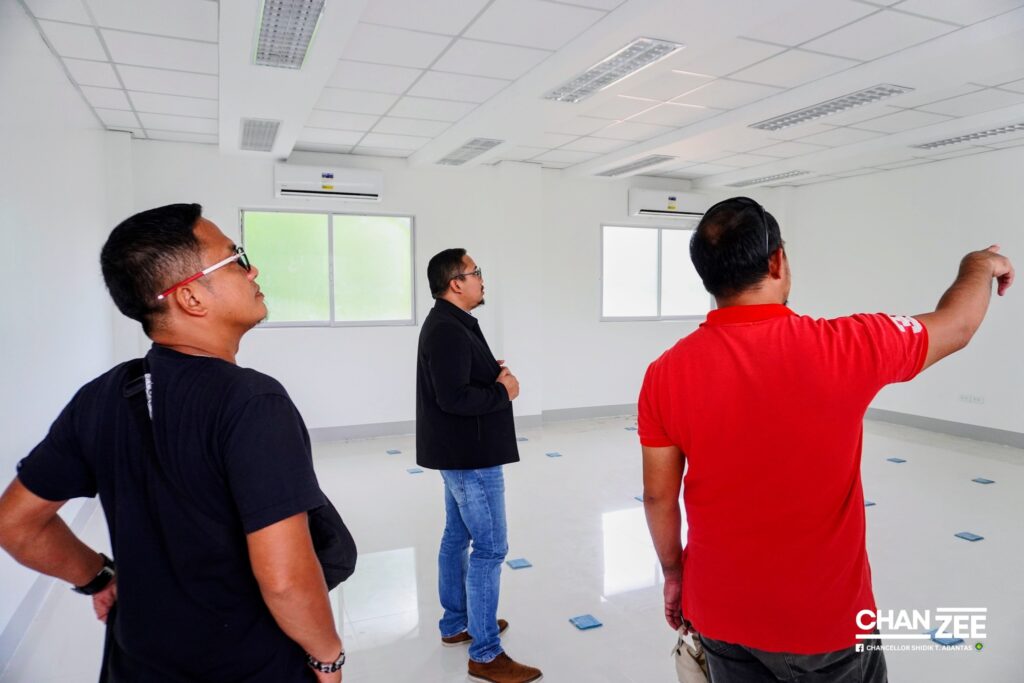
Mindanao State University – General Santos City continues its commitment to modernizing campus facilities and delivering high-quality education with the near-completion of its Information and Communications Technology (ICT) Complex. Chancellor Shidik Zed T. Abantas shared an update following his site inspections on May 6, 2025. He announced that the ICT Complex retrofitting is almost 100% finished, with e-classrooms and smart classrooms expected to become operational within the month. The university’s new data center is also in preparation for operation, as all electric supply transformers have already been delivered by the supplier. “I’m excited to inaugurate this complex soon,” Chancellor Abantas said, highlighting the university’s priority of advancing learning environments for students and faculty. He also inspected other key projects on campus, including the University Canteen and Virtual Learning Studios, which are both in their final stages of preparation. The university expects these facilities to be fully functional by August 2025. In addition to these developments, MSU-General Santos will begin retrofitting and renovating a total of 50 classrooms into smart classrooms this summer. Another 15 laboratories will also undergo retrofitting to support modern teaching and research needs. Chancellor Abantas emphasized his administration’s dedication to providing better, technology-enabled learning spaces that enhance teaching, student engagement, and academic excellence. “My administration is working 24/7 to bring better learning environments to our students and faculty,” he said. These significant infrastructure improvements reinforce MSU-General Santos’ vision of being a leading institution equipped with modern, accessible, and future-ready facilities that support quality education and innovation.
MSU-General Santos Welcomes Balik Scientist Dr. Benildo De los Reyes and Signs MOA with DOST PCAARRD to Advance Research and Innovation
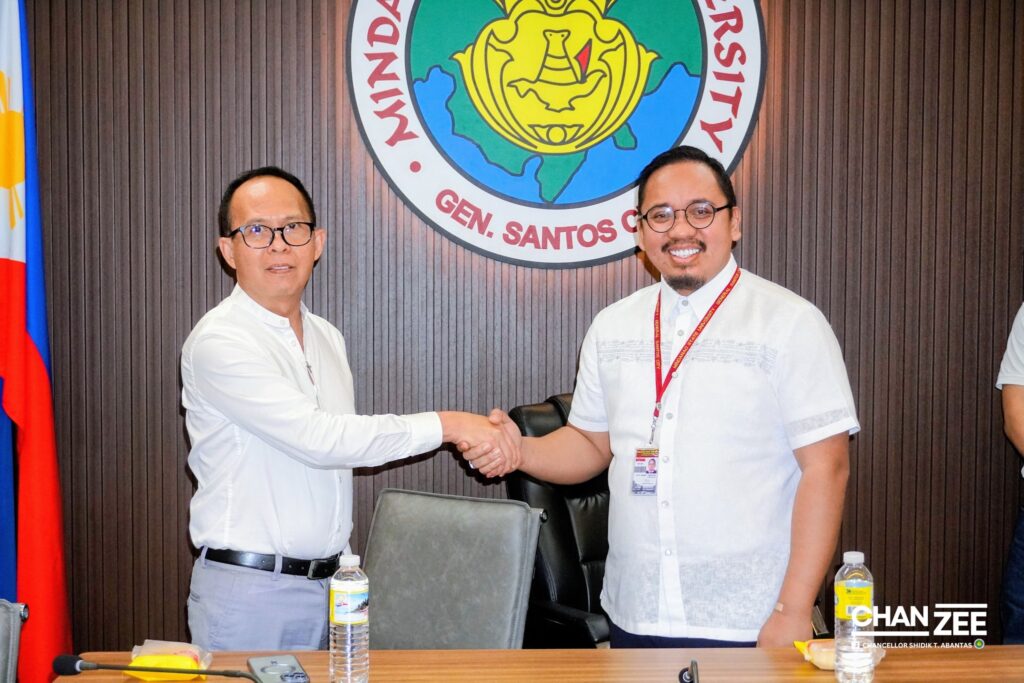
Mindanao State University – General Santos City proudly strengthens its research and innovation initiatives with the visit of Balik Scientist Dr. Benildo De los Reyes, a distinguished Professor of Genetics from Texas Tech University. On May 8, 2025, the university marked this important collaboration by officially signing a Memorandum of Agreement (MOA) with the Department of Science and Technology – Philippine Council for Agriculture, Aquatic and Natural Resources Research and Development (DOST PCAARRD). Dr. De los Reyes joins MSU-Gensan as part of the Balik Scientist Program, bringing with him a wealth of expertise in genetics, agricultural sciences, and academic research leadership. His mission is to help the university craft a comprehensive research and innovation agenda that targets key clusters critical to regional and national development, including fisheries and aquatic sciences, agriculture, and biodiversity. Beyond strategic planning, Dr. De los Reyes is also working closely with faculty to identify priority research areas, guiding them in designing high-quality proposals that enhance their chances of securing research funding from local and international agencies. Chancellor Shidik Zed T. Abantas emphasized that this partnership represents MSU-Gensan’s commitment to building a culture of research excellence that supports sustainable development, community empowerment, and scientific advancement in Mindanao and the Philippines. This collaboration with DOST PCAARRD and Dr. De los Reyes exemplifies MSU-Gensan’s role as a leading institution in driving innovation, capacity-building, and knowledge-sharing for the benefit of students, faculty, and society.
MSU-General Santos Strengthens Partnership with Joint Taskforce GenSan for Disaster Risk Reduction and Security Initiatives
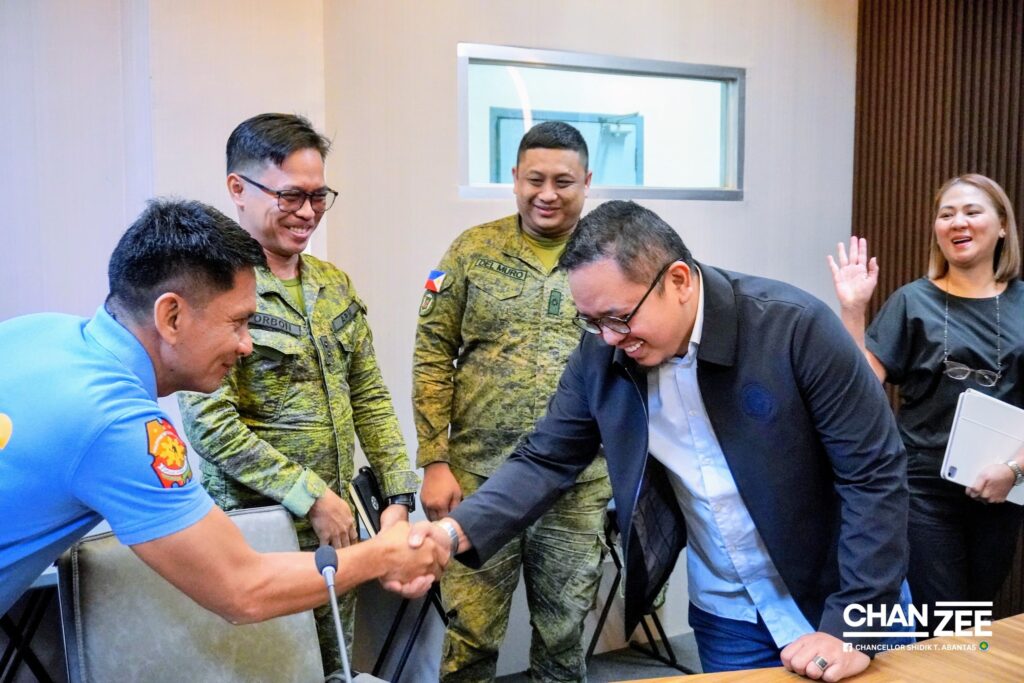
Mindanao State University–General Santos City reaffirms its dedication to fostering meaningful, strategic partnerships that serve the broader community and advance the region’s development goals. On April 25, 2025, Chancellor Shidik Zed T. Abantas formally welcomed representatives of the Joint Taskforce GenSan during a courtesy visit to his office. The visit underscores the university’s commitment to collaborative engagement on pressing local and regional issues. The courtesy meeting marked an important milestone in strengthening the ongoing partnership between MSU-Gensan and the Joint Taskforce GenSan. Participants discussed the critical need for sustained cooperation to address complex challenges faced by the SOCSARGEN region, including disaster risk reduction management, public safety, and security enhancement. Key discussions focused on building joint initiatives and programs that leverage the strengths of both institutions to improve preparedness, enhance security protocols, and mitigate risks in times of crisis. Such initiatives aim to protect not only the university community but also surrounding neighborhoods and municipalities that rely on MSU-Gensan as a hub of learning, innovation, and public service. During the meeting, Chancellor Abantas highlighted the essential role of partnerships in developing comprehensive, community-centered solutions. He expressed deep appreciation for the continued trust and collaboration extended by the Joint Taskforce GenSan, noting that effective disaster preparedness and security measures require strong alliances, shared knowledge, and coordinated action. “The safety and well-being of our students, faculty, and neighbors are of utmost importance,” Chancellor Abantas said. “By working hand in hand with our partners, we can create safer, more resilient communities equipped to face emergencies and ensure continuity of education and development even in times of crisis.” Beyond disaster and security planning, the partnership is also expected to facilitate training workshops, simulation exercises, and capacity-building activities for students, faculty, staff, and local responders. These programs will help equip stakeholders with vital skills in emergency response, crisis management, and community mobilization. This collaboration also aligns seamlessly with MSU-Gensan’s mission as an engaged, socially responsive university dedicated to holistic education and public service. By actively partnering with institutions like the Joint Taskforce GenSan, the university demonstrates its commitment to peace, security, and sustainable development, ensuring that its educational impact resonates well beyond the classroom. In reinforcing these partnerships, MSU-General Santos continues to champion a vision of a safe, prepared, and united community—one where education, security, and development go hand in hand to improve lives and build a more resilient future for all.

